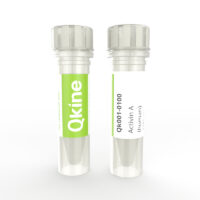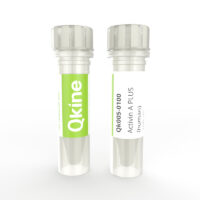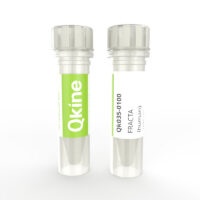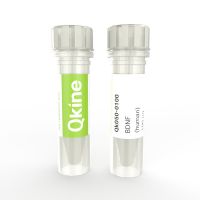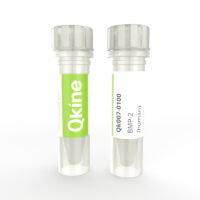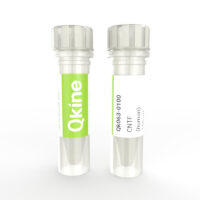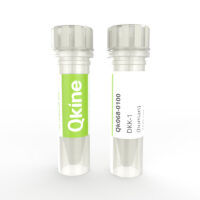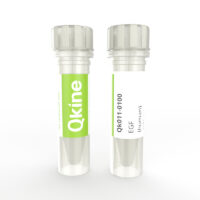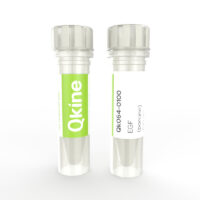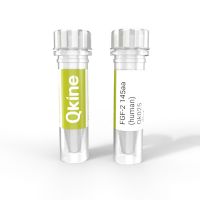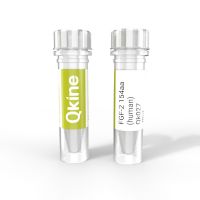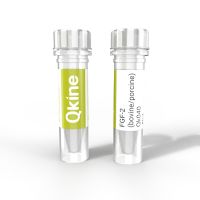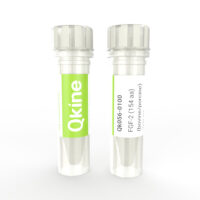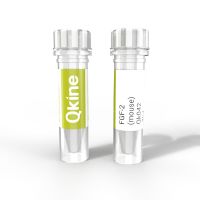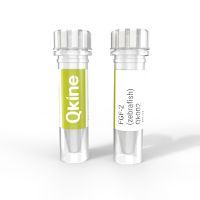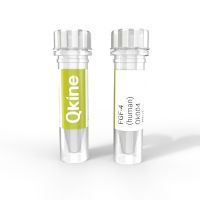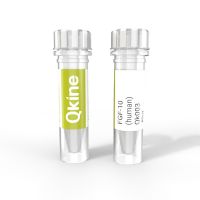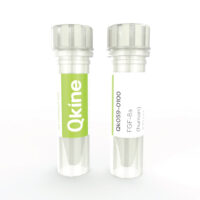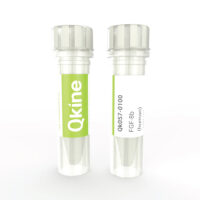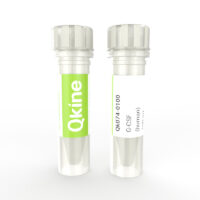- Activin A is a TGF-β family growth factor regulating embryonic development, cell proliferation, differentiation, and immune responses. Activin A is frequently used to maintain pluripotency in induced pluripotent and embryonic stem cell cultures. It is also used in many stem cell differentiation protocols, including endoderm lineage differentiation and further maturation into hepatocyte and pancreatic cells. Recombinant human/mouse/rat/bovine/porcine activin A protein is a high-purity mature bioactive dimer of 26 kDa. It is animal-free, carrier protein-free, and tag-free to ensure its purity with exceptional lot-to-lot consistency. This protein has been rigorously benchmarked against other commercial sources and extensively validated for highly reproducible stem cell culture. Qkine founder Marko Hyvönen developed the protocol for making high-purity activin A, and this protein is used at the Cambridge Stem Cell Institute. High purity mature bioactive dimer. Animal-free (AOF) and carrier-protein free (CF). Rigorously benchmarked against other commercial sources.
- Human/mouse/rat Activin A PLUS ™ protein is an optimised biologically active truncation of the mature domain of human Activin A protein. The EC50 and activity in stem cell culture of activin A PLUS is equivalent to the full mature domain activin A.High purity 24 kDa dimer comprising truncated mature domain of activin A protein, animal-free (AF) and carrier-protein free (CF). Recombinant Activin A PLUS is designed to be manufactured at scale for cost-effective, large-scale stem cell culture applications.
- Follistatin-resistant activin A protein (FRACTA) has been engineered to prevent binding to the natural inhibitor, follistatin. Activin A activity protein is regulated in vivo by follistatin, a high-affinity inhibitor; follistatin accumulates in stem cell culture, where it inhibits activin A.Qk035 follistatin-resistant activin A protein (FRACTA) has equivalent bioactivity to wild-type activin A (Qk001) but does not bind follistatin so is resistant to feedback inhibition. High purity 26 kDa dimer comprising engineered mature domain of activin A protein, animal-free (AF) and carrier-protein free (CF). This specialised activin A has been developed in Marko Hyvönen’s group in the University of Cambridge.
- Brain-derived neurotrophic factor (BDNF) is a member of neurotrophin family and plays a crucial role in neural development, maintenance, and function. It stimulates neurogenesis and is also a major regulator of synaptic plasticity and neuroprotection. It is used to maintain neurons and differentiate and mature human pluripotent stem cell-derived neural progenitors to cortical and motor neurons and cortical organoids.Recombinant human BDNF protein has a molecular weight of 14 kDa. This protein is animal-free, carrier-free, tag-free, and non-glycosylated to ensure its purity with exceptional lot-to-lot consistency. Qk050 is suitable for the culture of reproducible and high-quality cortical and motor neurons and cortical organoids.
- Human/mouse/rat/bovine/porcine BMP-2 protein (bone morphogenetic protein 2) protein is member of the TGFβ family and a key regulator of embryogenesis and potent differentiation factor of embryonic stem cells (ESC) and induced pluripotent stem cells (iPSC) towards endoderm fates. BMP-2 plays roles in the differentiation of mesenchymal cells to adipocytes, epithelial cancer EMT, chondrogenesis and regulation of neuronal and glial cell development.26 kDa disulfide–linked bioactive highly pure dimer comprised of the mature domain of human BMP-2 protein. Animal-free (AOF) and carrier protein-free.
- Ciliary Neurotrophic Factor (CNTF) is a member of the IL-6 family of cytokines. CNTF plays a crucial role in developing and maintaining the nervous system, in particular the optic nervous system. It promotes the maintenance, differentiation, and survival of various neurons, glial cells, and retinal cells.CNTF has been used in vitro to initiate neural induction and differentiation. CNTF can be used to culture primary neurons and glial cells such as astrocytes and Schwann cells. It is also used to culture retinal cells and adipocytes.Human CNTF has a molecular weight of 22.8 kDa. This protein is carrier-free, tag-free, and non-glycosylated to ensure its purity with exceptional lot-to-lot consistency. Qk063 is suitable for the culture of reproducible and high-quality neurons and other relevant cells.
- Dickkopf-related protein 1 (DKK-1) is a key player in the Wnt signaling pathway and regulates embryonic development, tissue balance, and diseases, including cancer. DKK-1 is a member of the DKK protein family and acts as a potent Wnt pathway antagonist.In cell culture, DKK1 is pivotal for controlling cell fate, self-renewal, and differentiation by inhibiting the canonical Wnt/β-catenin pathway through LRP5/6 co-receptors. DKK-1 has been widely used in various applications including guiding stem cell differentiation, particularly in neural and osteogenic pathways, and mimicking dysregulated Wnt signaling seen in cancers. Its inhibitory role is also crucial for anterior development.Human DKK-1 has a molecular weight of 25.7 kDa. This protein is carrier-free and tag-free to ensure its purity with exceptional lot-to-lot consistency. DKK1 is suitable for the culture of reproducible and high-quality stem cells and other relevant cells.
- Human EGF protein is a potent EGF-family growth factor used in many human and mouse organoid and stem cell culture systems including intestinal and tumor (cancer) organoid culture.A pure 6.3 kDa biologically active mature human epidermal growth factor. Our recombinant EGF protein is manufactured to the highest purity in E. coli and extensively tested, making it ideal for use in chemically defined iPSC, ESC and organoid culture media.
- Porcine EGF is an essential growth factor belonging to the Epidermal Growth Factor family that stimulates the proliferation and differentiation of cells. It is used for the differentiation of induced pluripotent stem cells (iPSCs) and embryonic stem cells (ESCs) towards epithelial, neural, mesoderm and hematopoietic lineages. Porcine-EGF is becoming rapidly adopted as a species-specific growth factor in the cultivated meat sector. Porcine EGF is also an essential component of many organoid media supporting the culture and differentiation of a wide variety of organoids including intestine and liver organoids.Porcine EGF has a molecular weight of 6.3 kDA. This protein is animal-free, carrier protein-free, His-tag-free and non-glycosylated to ensure a pure recombinant protein with exceptional lot-to-lot consistency.
- Human FGF2 /bFGF protein (145 aa) is our gold-standard and recommended FGF2 / bFGF protein for induced pluripotent stem cell (iPSC) and embryonic stem cells (ESC) maintenance, and induced pluripotent and mesenchymal stem cells proliferation and differentiation.High purity and bioactivity 17 kDa FGF2 / bFGF protein, animal-derived component free (ACDF) and carrier-protein free (CF) comprising the core structured region (145 amino acids) sufficient for full biological activity.
- Recombinant human FGF2 protein (154 aa) is a highly bioactive, long–form of human fibroblast growth factor 2 protein. FGF-2 protein is used to support the maintenance of human embryonic stem cells and proliferation and differentiation of induced pluripotent and mesenchymal stem cells. This 154 aa form of FGF-2 comprises the core structured region and N-terminal extension.High purity and bioactivity 17 kDa FGF-2 / bFGF protein, animal-free (AOF) and carrier-protein free (CF).
- Recombinant bovine/porcine FGF2 protein 145 aa (bFGF/basic FGF) for the development of species-specific bovine (cow) and porcine (pig) cellular agriculture protocols and veterinary research applications. Used in comparative cell culture media optimization studies alongside Qk056, the 154aa form of porcine/bovine FGF-2.FGF-2 is used extensively in the maintenance and proliferation of induced pluripotent (iPSC) and embryonic stem cells (ESC)1-3 and for enhancement of proliferation in primary cell culture.High purity 16 kDa FGF-2 / bFGF protein, animal origin-free (AOF) and carrier-protein free (CF).
- Recombinant bovine/porcine FGF2 protein 154 aa (bFGF/basic FGF), this is the long form of FGF-2 used for the development of optimized serum-free culture media for species-specific bovine (cow) and porcine (pig) cultivated meat and veterinary research applications. Used in comparative media optimization studies with Qk040 porcine/bovine FGF-2 145 aa.FGF-2 is used extensively in the maintenance and proliferation of induced pluripotent (iPSC) and embryonic stem cells (ESC)1-3 and for enhancement of proliferation in primary cell culture.High purity 16 kDa FGF-2 / bFGF 154 aa protein, animal origin free (AOF) and carrier-protein free (CF).
- Recombinant mouse FGF2 protein/ bFGF is an important factor in the maintenance of mouse epiblast-derived stem cells (EpiSC). Mouse naïve pluripotency is maintained by LIF, BMP4, and Wnt signalling pathways. However, the primed state of pluripotency in mouse EpiSCs is more similar to hESC and hiPSC, being maintained by FGF2 and TGFβ/Activin/Nodal pathways.1,2High purity and bioactivity 16 kDa murine bFGF / FGF2 (basic FGF) protein, animal-origin free (AOF) and carrier-protein free (CF).
- Zebrafish FGF-2 protein (bFGF/basic FGF) has been used extensively to support the maintenance and proliferation of human and mouse induced pluripotent (iPSC) and embryonic stem cells (ESC); used in the original Ludwig et al feeder-free culture of embryonic stem cells protocols 1-3. High purity 17 kDa FGF2 / bFGF protein, animal-derived component free (ACDF) and carrier-protein free (CF). This version of recombinant zebrafish FGF2 is used by the core facility at the Cambridge Stem Cell Institute, UK and historically by many of the stem cell groups based at University of Cambridge.
- Human FGF-4 protein is used for the proliferation and differentiation of embryonic and induced-pluripotent and tissue (mesenchymal) stem cells and promotes neural stem cell proliferation. FGF-4 is an important component of cardiac, intestinal and other organoid culture media.High purity and bioactivity 14 kDa, bioactive domain of human fibroblast growth factor 4, animal origin free (AOF) and carrier-protein free.
- Human/rat/porcine/bovine FGF10 protein promotes lung organoid formation and induces branching morphology. FGF10 protein is used widely in organoid culture, embryonic stem cell (ESC) and induced-pluripotent stem cell (iPSC) differentiation, and for the study of epithelial to mesenchymal transition and tumor metastasis.High purity and bioactivity 17 kDa, bioactive domain of human fibroblast growth factor 10, animal-free (AOF) and carrier-protein free (CF).
- Fibroblast growth factor 8a (FGF-8a) is a member of the FGF family and plays a key role in the regulation of embryogenesis, cellular proliferation, differentiation, and migration. FGF8a is often used for the differentiation of induced pluripotent stem cells, embryonic stem cells, and neural stem cells.FGF8a is a spliced form of FGF8, a heparin-binding protein that targets mammary and non-mammary cells expressing the FGF receptors. A 21.3kDa highly pure, bioactive recombinant protein produced in an animal-free expression system. This protein is animal-origin free (AOF), carrier protein-free, tag-free, and non-glycosylated to ensure a pure homogenous protein with exceptional lot-to-lot consistency. Qk059 is suitable for enhanced reproducibility and physiologically relevant cultures.
- Fibroblast growth factor 8b (FGF-8b) is a member of the FGF family involved in the regulation of embryogenesis, cellular proliferation, differentiation, and migration.FGF8b is commonly used for the differentiation of induced pluripotent stem cells into neural cell types and brain organoid cultures.FGF8b is a spliced form of FGF8, a heparin-binding protein that targets mammary and non-mammary cells expressing the FGF receptors. A 22.5 kDa highly pure, bioactive recombinant protein produced in an animal-free expression system. This protein is carrier-free, tag-free and non-glycosylated to ensure a pure, homogenous protein with exceptional lot-to-lot consistency. Qk057 is suitable for enhanced reproducibility and physiologically relevant cultures.
- Granulocyte colony-stimulating factor (G-CSF) is a member of the hematopoietic growth factor family which plays a crucial role in the proliferation, differentiation, and maturation of committed progenitor cells to granulocytes, such as neutrophils. G-CSF is produced by various cell types including macrophages, fibroblasts, and endothelial cells. It binds to the G-CSF surface receptors upon stimulation to activate key cellular processes involved in neutrophil proliferation, maturation, and mobilization in healthy and diseased states.G-CSF is commonly used in vitro to maintain neutrophils and stimulate the differentiation of cells to neutrophil lineage. is a highly pure, bioactive glycoprotein produced in an animal-free expression system composed of 174 amino acids with a molecular weight of 18.6 kDa. Human and murine G-CSF are 73% identical at the amino acid level and show species cross-reactivity. Human G-CSF is carrier-free, tag-free, and non-glycosylated to ensure a pure and homogenous production of high-quality neutrophils and other relevant cell cultures with exceptional lot-to-lot consistency.
